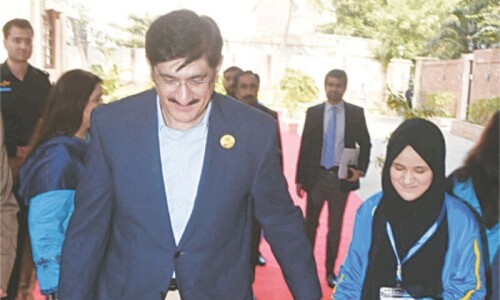KARACHI, Jan 2: An inquiry tribunal investigating the Oct 18 Karsaz bombings was told on Wednesday that the leadership of the Pakistan People’s Party was not consulted about the registration of the FIR lodged on behalf of the state within three hours of the twin blasts.
The tribunal, headed by Justice (retd) Dr Ghaus Mohammad, cross-examined a witness, the then SHO of Bahadurabad police station, Sub-Inspector Abid Hussain Shah, who was a complainant in the case of the Oct 18 twin blasts in former prime minister Benazir Bhutto’s homecoming procession.
SI Shah told the tribunal that the first blast took place at about 0010 hours and he registered the FIR at 0315 hours. “Did you inform your superiors that you were going to lodge the FIR?” asked the tribunal, to which the witness said he had discussed the matter with SDPO Nawaz Ranjha, who asked him to register it.
The tribunal asked whether he or his superior officials approached the PPP leadership and asked them to come and lodge the FIR as a complainant. “I could not contact any PPP leader though I tried to do so,” he said.
Answering another question, SI Shah said that on Oct 21 PPP leaders Nisar Khuhro, Aftab Shaaban Mirani, Qaim Ali Shah and Sherry Rehman approached him for the registration of an FIR through an application signed by former prime minister Benazir Bhutto. “I accepted their application and sent it to the investigation officer, Inspector Rais,” he added.
The policeman informed the tribunal that under the security plan he was posted at Awami Markaz and he moved towards the rally when he was informed that the rally had crossed the Karsaz bridge. He said he was about 300 yards on the right of the float carrying Ms Bhutto and other PPP leaders when the first blast occurred. He said he found the head of a suspected suicide bomber at a distance of 26 feet on the left of the blast spot.
Suspects’ escape
He went on to say that after the first blast he noticed three or four suspects running away from the place of the incident towards the adjoining lanes. He said he did not chase the suspects due to the stampede-like situation as people were lying wounded and he himself shifted some of the injured and the dead to hospital in a police van.
“The primary task of police is to arrest culprits. I appreciate you shifted injured people to hospital but what measures did you take when the suspects were fleeing? Did you relay a message on the wireless to inform the rest of police about their escape?” Justice Ghaus asked. The embarrassed SI had no option but to concede that he did not inform anyone regarding the suspects’ escape.
“You wrote in the FIR that through ‘mutual consultation’ the suspected terrorists managed to carry out the two blasts with the intention to kill Ms Bhutto and PPP leadership and to create terror in the masses. How did you know that they held mutual consultation? Were you present at the time of the consultation?” the tribunal asked him, upon which he maintained that he was not present at the time when the alleged assailants consulted one another.
Justice (retd) Dr Ghaus observed that the FIR was the launching pad of any case and mentioning of such facts in the FIR showed that he was aware of the assailants’ consultation and their intention. SI Shah clarified that he wrote such things in the FIR because of his experience that such incidents always took place with mutual consultation.
The tribunal asked whether his senior officers asked him about the fleeing of the suspects and why he was shifting the injured to the hospital instead of chasing the suspects. “All my senior officers inquired about the running away of the suspects. I explained my position and none of my seniors called my explanation in that regard,” he said.
The witness admitted that police were also present on all sides when he first spotted the suspects. “Did you ask any policeman to catch the fleeing suspects?” inquired the tribunal, upon which the then SHO of Bahadurabad said he did not call any policeman near the suspects due to the occurrence of the second blast.
He informed the tribunal that some unknown persons were responsible for the blasts and it was possible that the suspects might have been responsible for the blasts.
He said that after 15 to 20 days of the incident he was transferred from the Bahadurabad police station, therefore he was not aware of the progress in the investigation.
The tribunal adjourned its proceedings for Thursday.
Earlier, when the proceedings began, DIG (Headquarters) Waseem Ahmed recorded his statement. He produced copies of the minutes and letters.
He deposed that after the Oct 18 incident, a meeting was held in the office of the Sindh inspector-general to review the details of the incident. The meeting was attended by PPP leaders and senior police officers. However, no minutes of the meeting were recorded.
“Did the PPP leaders complained of a security lapse in the post-incident meeting?” asked the tribunal. The DIG said the PPP leaders did not make any complaint, appreciated the security arrangements made by police, and offered condolences for the policemen killed in the blasts.














































Dear visitor, the comments section is undergoing an overhaul and will return soon.